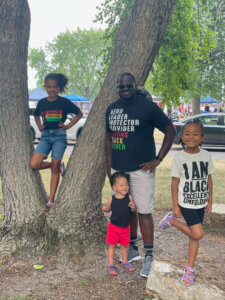Always learning about Black history: Walfsty Pierre
March 19, 2024
| By La Crosse Community Foundation |
Every month is Black History Month
For Northside Elementary social worker and family man Walfsty Pierre, every month is Black History Month.
Pierre, who juggles his professional duties with active participation in community events celebrating diversity, is deeply involved in La Crosse’s Juneteenth festival and the Enduring Families Project. His journey with these initiatives began with his connection to B.L.A.C.K. (Black Leaders Acquiring Collective Knowledge), which opened doors for him to contribute more significantly to the community.
Despite a busy schedule, Pierre’s move to the area and subsequent role in the Greater La Crosse area marked the beginning of his increased involvement in local events, representing his commitment to making a positive impact in both his professional and community roles.

Walfsty Pierre makes his participation in community events like Juneteenth, pictured here, a family affair because he wants his daughters, along with other Black youth, to know that despite challenges, they can achieve great things.
Why is it important to celebrate Black History Month?
Celebrating Black History Month is important for me personally and for teaching my children. Growing up in Miami, where everyone looked like me, I didn’t fully appreciate its significance. But now I realize it’s more than just about Martin Luther King Jr. or Harriet Tubman. There are countless unsung heroes who have made significant contributions, from those who fought for freedom to inventors and leaders.
It’s a time to refresh our memory about these great individuals and to educate our kids about their varied achievements. It’s key for the whole community to participate, to show that Black history is rich with varied accomplishments. Figures like George Edwin Taylor, who ran for president, are part of this history.
Teaching Black history is about showing the resilience and success of those who overcame barriers. It’s about inspiring our current generation to understand that despite challenges, they can achieve great things. Celebrating this month reminds us of the perseverance of our ancestors and motivates us to continue striving for success, regardless of our circumstances.
How do local Black History Month events and others throughout the year build social capital?
Local Black History Month events and others throughout the year, like the MLK Day of Service at Viterbo and the Juneteenth festival, play an important role in building social capital. These events are opportunities for learning, open-mindedness, and community bonding.
At these events, I’ve had enriching conversations with people outside my race, fostering understanding and unity. These gatherings are not just for Black people; they attract diverse crowds, though I wish more Black families would participate. Events like Juneteenth hold special significance for me and my kids. We dress in red, green, and yellow, savor the food, and immerse ourselves in the joy of the celebration. And it’s rewarding to see my students there, recognizing me not just as a staff member but as a community member.
These events, along with others like the Enduring Families Project and August Ball, highlight the importance of community and enjoyment, offering everyone a chance to celebrate, learn, and grow together.
How do you integrate these concepts into your life?
In my work with students, I strive to create inclusive spaces. It’s challenging for students in our area to find positive influences, especially amid the negativity on social media. So, I focus on connecting them with positive adults through B.L.A.C.K.’s Ujima Circles program. This involves building connections with adults, community members, and younger students who’ve had similar experiences. Understanding the importance of these connections in healing from trauma is key.
I also engage in public speaking to educate about trauma and mental health. This helps in creating opportunities for growth and understanding.
In terms of third places in La Crosse, I find the church I attend to be very inclusive. The preaching is impactful and creates a welcoming community. Also, as a school social worker, I offer opportunities for enrichment to students during intercession. This includes teaching them practical skills like using public transportation and exploring safe community spaces.
Through these efforts, I emphasize the importance of relationships, communication, and being open to support from diverse individuals, not just those who look like us. It’s critical to communicate needs and be willing to ask for help, recognizing that allies come in many forms.
